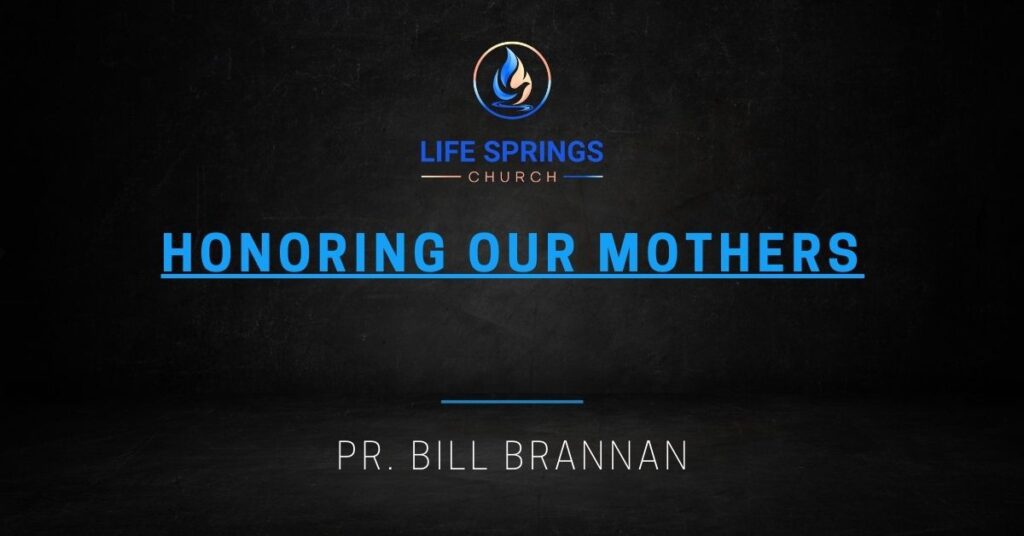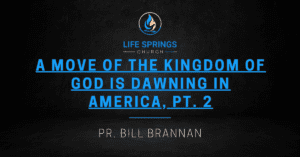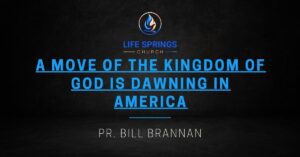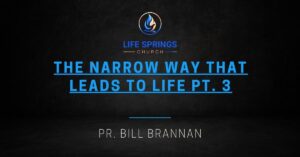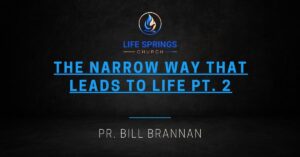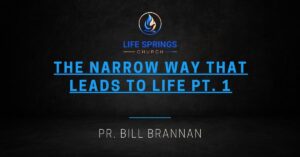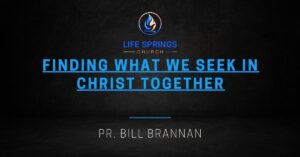The Hidden Truth About Honoring Parents: A Mother’s Day Reflection

In this enlightening message by Pastor Bill Brannan, we explore the profound significance of honoring our parents and how this biblical command shapes our lives and society. By delving into Scripture, we uncover the spiritual inheritance tied to this commandment and its vital role in fostering family values and traditions for future generations.
Honoring Our Mothers
Honoring our mothers is a profound act that transcends mere words. It is a commitment to recognize their sacrifices, love, and the foundational roles they play in our lives. In many cultures, mothers are revered as the heart of the family, nurturing their children and instilling values that shape their future. This recognition is not just a personal sentiment; it is a societal imperative that fosters respect and gratitude.

Photo by Trung Nhan Tran on Unsplash
As we reflect on the significance of honoring mothers, we must acknowledge the legacy they pass down through generations. This legacy includes not only love and care but also the wisdom and traditions that guide us. By honoring our mothers, we also honor the values they represent and the sacrifices they have made for our well-being.
The Impact of a Mother’s Love
A mother’s love is often described as unconditional. This love shapes our identities and influences our choices throughout life. It is within the warmth of a mother’s embrace that we first learn about compassion, kindness, and resilience. A mother’s influence extends beyond the home, impacting society as a whole.

Photo by Simon Hurry on Unsplash
In recognizing the importance of a mother’s role, we also acknowledge the challenges they face. Balancing work, family, and personal aspirations requires immense strength and dedication. Honoring our mothers means supporting them in these endeavors and ensuring they feel appreciated and valued.
The World God Wants Us to Experience
God envisions a world where love, respect, and compassion reign supreme. This divine blueprint calls for a society that flourishes when its members adhere to values that promote mutual respect and understanding. The teachings of Scripture guide us toward this ideal, emphasizing the importance of community and familial bonds.

Photo by JIEUN KWON on Unsplash
In this world, we are encouraged to cultivate relationships that reflect God’s love. By fostering connections built on respect and understanding, we create an environment where everyone can thrive. This vision is not merely aspirational; it is attainable when we commit to living according to divine principles that prioritize love and service to others.
Creating a Flourishing Community
A world characterized by flourishing is one where individuals are empowered to pursue their dreams and contribute positively to society. This flourishing is rooted in the principles of love and mutual respect, which are foundational to a thriving community. When we honor our mothers and the values they embody, we lay the groundwork for a society built on these principles.

Photo by Swastik Arora on Unsplash
To create such a community, we must actively engage in practices that promote love and respect. This includes supporting one another in times of need, celebrating each other’s successes, and fostering an environment of inclusivity. By embodying these values, we contribute to the flourishing of our communities and honor the legacy of our mothers.
The Law Creates a World of Human Flourishing
The law, when viewed through the lens of divine intention, is not merely a set of rules but a framework for human flourishing. It serves as a guide that directs our actions toward love, justice, and compassion. By adhering to these laws, we align ourselves with God’s vision for a harmonious society.

Photo by Tingey Injury Law Firm on Unsplash
Understanding the law in this context shifts our perspective from viewing it as a burden to recognizing it as a pathway to freedom. The principles embedded in the law promote not only individual well-being but also the collective good. When we respect the law, we create a stable environment where everyone can thrive.
Transformative Power of the Law
The transformative power of the law lies in its ability to shape character. As we internalize these principles, we cultivate a sense of responsibility and accountability. This transformation is essential for fostering a society where love and respect prevail. The law encourages us to look beyond ourselves and consider the impact of our actions on others.

Photo by Nicolas Jossi on Unsplash
By embracing the law as a means of promoting human flourishing, we contribute to a world that reflects God’s love. This commitment to justice and compassion lays the foundation for a society where every individual has the opportunity to thrive.
Well-Ordering Society
A well-ordered society is one where individuals understand their roles and responsibilities. This understanding fosters a sense of community and belonging, essential for collective growth. In such a society, the values of love, respect, and cooperation guide interactions, creating an environment conducive to flourishing.

Photo by Markus Spiske on Unsplash
To achieve a well-ordered society, we must prioritize education and mentorship. By instilling values in the next generation, we ensure that the principles of love and respect are upheld. This commitment to nurturing future leaders is essential for maintaining the fabric of our communities.
The Role of Leadership
Effective leadership plays a crucial role in establishing a well-ordered society. Leaders must exemplify the values they wish to see in their communities, demonstrating integrity, compassion, and respect. By doing so, they inspire others to follow suit, creating a ripple effect that fosters a culture of flourishing.

Photo by Ian Schneider on Unsplash
Moreover, leaders should actively engage with their communities, seeking input and fostering dialogue. This engagement builds trust and ensures that the voices of all members are heard and valued. A well-ordered society thrives on collaboration, where everyone feels empowered to contribute to the common good.
Importance of the Family
The family is the cornerstone of society, serving as the first institution where individuals learn the values that shape their lives. Within the family unit, we develop our understanding of love, respect, and responsibility. Honoring our parents is integral to preserving the values that sustain healthy family dynamics.

Photo by Clayton Cardinalli on Unsplash
As we navigate the complexities of modern life, the importance of nurturing strong family bonds cannot be overstated. Families provide support, guidance, and a sense of belonging. By prioritizing family values, we contribute to a healthier society where individuals feel secure and valued.
Building Strong Family Foundations
To build strong family foundations, we must prioritize communication and understanding. Open dialogue fosters trust and allows family members to express their thoughts and feelings. This practice not only strengthens familial bonds but also cultivates a culture of respect and empathy.

Photo by Limor Zellermayer on Unsplash
Additionally, creating traditions and shared experiences reinforces family connections. Whether through regular family gatherings or shared activities, these moments create lasting memories and instill a sense of belonging. By investing in our families, we honor our mothers and the values they represent.
Rule of Law
The rule of law is a fundamental principle that upholds justice and equality within society. It ensures that everyone, regardless of status, is held accountable to the same standards. This principle is essential for maintaining order and fostering trust among community members.

Photo by wd toro 🇲🇨 on Unsplash
By embracing the rule of law, we create an environment where individuals feel safe and valued. This sense of security is crucial for promoting human flourishing, as it allows people to pursue their goals without fear of oppression or injustice. Upholding the rule of law is a collective responsibility that requires the commitment of every member of society.
The Intersection of Law and Morality
The intersection of law and morality is vital in shaping a just society. Laws grounded in moral principles reflect the values that promote human dignity and respect. By adhering to these laws, we align ourselves with a higher standard that transcends societal norms.

Photo by Mika Baumeister on Unsplash
Moreover, educating individuals about the importance of moral values in the context of the law fosters a culture of accountability. When people understand that their actions have consequences, they are more likely to act with integrity and compassion. This understanding is essential for creating a society where love and respect prevail.
The Two Worlds
Understanding the concept of the two worlds—the world of bondage and the world of liberty—provides insight into the human experience. The world of bondage represents oppression and despair, while the world of liberty embodies hope and flourishing. This dichotomy is essential for grasping the transformative power of faith and community.

Photo by Nick Fewings on Unsplash
The transition from bondage to liberty is not merely a physical journey; it is a spiritual awakening. As individuals embrace their identity in Christ, they move from a place of despair to one of hope and purpose. This transformation is at the heart of our faith, guiding us toward a life that honors God and serves others.
Navigating the Wilderness
The wilderness represents the journey between these two worlds. It is a time of growth, learning, and transformation. During this period, individuals are challenged to confront their fears and insecurities, ultimately emerging stronger and more resilient.

Photo by Simon Fitall on Unsplash
As we navigate our personal wilderness experiences, we must lean on our faith and the support of our communities. This journey is not meant to be undertaken alone; together, we can encourage one another and foster a spirit of resilience. By embracing the lessons learned in the wilderness, we prepare ourselves for the flourishing life that God desires for us.
Reframing History
Reframing history is essential for personal growth and societal progress. It involves viewing past experiences through a lens of forgiveness and understanding rather than resentment. This shift in perspective allows us to break free from the chains of our past and embrace a future filled with hope and opportunity.
God’s directive to not harbor hatred for the Egyptians highlights the importance of reframing our narratives. By recognizing that we are all part of a larger story, we can let go of bitterness and resentment. Understanding that we are strangers in this world encourages us to cultivate compassion, paving the way for a more harmonious existence.
Forgiveness as a Foundation
Forgiveness is a powerful tool in the process of reframing history. It liberates us from the burden of past grievances and allows us to focus on what truly matters—love, hope, and community. When we choose to forgive, we not only heal ourselves but also create an environment where others can thrive.

Photo by Lampos Aritonang on Unsplash
By embracing forgiveness, we reject the cycle of anger and resentment that can so easily ensnare us. This conscious decision to forgive is transformative, enabling us to build a future grounded in positivity and mutual respect. It is through this lens that we can honor our parents and ancestors, acknowledging their struggles while celebrating their contributions to our lives.
Principles of Liberty
The principles of liberty are fundamental to creating a society where individuals can flourish. These principles emphasize the importance of personal responsibility, respect for others, and the pursuit of justice. By adhering to these values, we foster an environment conducive to growth and collaboration.

Photo by Phạm Chung 🇻🇳 on Unsplash
One crucial aspect of liberty is understanding that it cannot exist alongside hatred and resentment. A society built on these negative emotions will inevitably collapse under the weight of its own discord. Instead, we must cultivate an atmosphere of love and acceptance, where every individual is valued and respected.
Building a Culture of Respect
To promote liberty, we must actively engage in building a culture of respect. This involves listening to one another, valuing diverse perspectives, and fostering open dialogue. Such practices encourage individuals to express themselves freely while ensuring that everyone feels heard and appreciated.

Photo by Christina @ wocintechchat.com on Unsplash
Additionally, teaching the next generation about the principles of liberty is vital. By instilling these values early on, we empower young people to navigate the complexities of life with integrity and compassion. This foundation is essential for creating a future where liberty thrives.
What is a Gentleman
A gentleman embodies qualities of integrity, respect, and selflessness. He is someone who prioritizes the well-being of others and acts with courage and honor. This ideal is not merely about manners but is deeply rooted in a commitment to uphold the values that foster a thriving society.

Photo by Motoki Tonn on Unsplash
Being a gentleman requires continuous self-reflection and growth. It is a lifelong journey of striving to be better, not just for oneself but for the community at large. This pursuit of excellence inspires others to do the same, creating a ripple effect of positive behavior.
Characteristics of a Gentleman
- Integrity: A gentleman acts with honesty and adheres to his principles.
- Respect: He treats everyone with dignity, regardless of their status.
- Selflessness: A gentleman puts the needs of others before his own.
- Courage: He stands up for what is right, even in the face of adversity.

Photo by Guillermo Diaz on Unsplash
By embodying these characteristics, a gentleman contributes to a culture of respect and honor. This commitment not only elevates his own life but also positively impacts those around him. In striving to be a gentleman, we uphold the legacy of those who came before us and pave the way for future generations.
What is a Lady
A lady exemplifies grace, strength, and kindness. She is a nurturer who creates a supportive environment for those around her. The attributes of a lady go beyond superficial qualities; they are rooted in character and integrity.

Photo by Brooke Lark on Unsplash
Being a lady involves embracing one’s identity and using it to uplift others. This means being confident in one’s abilities while remaining humble and compassionate. A lady recognizes the importance of her role in society and seeks to make a positive impact.
Characteristics of a Lady
- Grace: A lady carries herself with poise and elegance.
- Strength: She faces challenges with resilience and determination.
- Kindness: A lady extends compassion to those in need.
- Wisdom: She offers guidance and support to others.

Photo by Priscilla Du Preez 🇨🇦 on Unsplash
By embodying these attributes, a lady contributes to a nurturing and supportive society. Her influence can inspire others to rise to their best selves, creating a culture of respect and kindness. In honoring the legacy of women before us, we empower ourselves and future generations to continue this tradition.
Proverbs 31 – The Virtuous Woman
Proverbs 31 presents a powerful depiction of the virtuous woman. Her worth is described as being far above rubies, highlighting the immeasurable value she brings to her family and community. This passage serves as a reminder of the incredible impact women have in shaping society.

Photo by Thought Catalog on Unsplash
The virtuous woman is industrious, wise, and compassionate. She takes initiative in providing for her family and extends her hand to those in need. Her strength and honor are evident in her actions, and her legacy is one of love and dedication.
Attributes of the Virtuous Woman
- Industriousness: She works diligently, ensuring her household is well cared for.
- Wisdom: She speaks with kindness and offers sound advice.
- Compassion: She reaches out to the poor and needy.
- Strength: She faces challenges with resilience.

Photo by Sai De Silva on Unsplash
The virtuous woman exemplifies the values we aspire to embody. Her life is a testament to the power of dedication, love, and integrity. By honoring her legacy, we can inspire future generations to embrace these qualities and continue the tradition of virtuous living.
Closing Prayer
As we reflect on the importance of honoring our parents and embracing the values of love, respect, and forgiveness, let us take a moment to pray. Heavenly Father, we thank You for the gift of family and the legacy of those who came before us. Help us to honor our mothers and fathers by embodying the principles of liberty, integrity, and compassion in our lives.

Photo by Ezgi Deliklitas on Unsplash
May we strive to be gentlemen and ladies, setting an example for future generations. Grant us the strength to forgive, the wisdom to learn from our past, and the courage to build a brighter future. We ask this in Your name. Amen.
Honoring Our Mothers
(Preaching Outline)
1) Since it is Mother’s Day, we will begin by reading:
a) Deuteronomy 5:16 (NKJV) — 16 ‘Honor your father and your mother, as the Lord your God has commanded you, that your days may be long, and that it may be well with you in the land which the Lord your God is giving you.
b) Describe the land the Lord our God is giving us.
c) Describe the purpose of the law & (Refer to Mel’s sermon on the great commission).
d) Describe a world of order vs. disorder – personal and social.
i) The soul of man and of society
ii) The family.
iii) Mothers in first and greater society.
iv) The church
e) Describe the Western inheritance.
f) Kirk Russel in The Roots of American Order – Common or the people’s law: The higher kind of order, sheltering freedom and justice, declares the dignity of man. It affirms what G. K. Chesterton called “the democracy of the dead”—that is, it recognizes the judgments of men and women who have preceded us in time, as well as the opinions of people living at this moment. This higher kind of order is founded upon the practical experience of human beings over many centuries, and upon the judgments of men of vision and intellect who have preceded us in time.[1]
g) The Exodus – from slave mentality to self-governance – immaturity to maturity.
h) A mother’s heart.
i) Honoring fathers and mothers is part of passing on a world of liberty and human flourishing.
j) How – Two of many principles for us to honor our fathers and mothers from the Exodus:
2) A world of liberty and human flourishing cannot be created with hatred and division.
a) Deuteronomy 23:7b (NKJV) — 7 “You shall not abhor an Egyptian, because you were an alien in his land.
3) A world of liberty cannot be created by complainers.
a) Numbers 14:2–4 (NKJV) — 2 And all the children of Israel complained against Moses and Aaron, and the whole congregation said to them, “If only we had died in the land of Egypt! Or if only we had died in this wilderness! 3 Why has the Lord brought us to this land to fall by the sword, that our wives and children should become victims? Would it not be better for us to return to Egypt?” 4 So they said to one another, “Let us select a leader and return to Egypt.”
b) 1 Thessalonians 5:16–18 (NKJV) — 16 Rejoice always, 17 pray without ceasing, 18 in everything give thanks; for this is the will of God in Christ Jesus for you.
4) Ladies and Gentlemen – Well ordered souls
a) Proverbs 31:10–31 (NKJV) — 10 Who can find a virtuous wife? For her worth is far above rubies. 11 The heart of her husband safely trusts her; So he will have no lack of gain. 12 She does him good and not evil All the days of her life. 13 She seeks wool and flax, And willingly works with her hands. 14 She is like the merchant ships, She brings her food from afar. 15 She also rises while it is yet night, And provides food for her household, And a portion for her maidservants. 16 She considers a field and buys it; From her profits she plants a vineyard. 17 She girds herself with strength, And strengthens her arms. 18 She perceives that her merchandise is good, And her lamp does not go out by night. 19 She stretches out her hands to the distaff, And her hand holds the spindle. 20 She extends her hand to the poor, Yes, she reaches out her hands to the needy. 21 She is not afraid of snow for her household, For all her household is clothed with scarlet. 22 She makes tapestry for herself; Her clothing is fine linen and purple. 23 Her husband is known in the gates, When he sits among the elders of the land. 24 She makes linen garments and sells them, And supplies sashes for the merchants. 25 Strength and honor are her clothing; She shall rejoice in time to come. 26 She opens her mouth with wisdom, And on her tongue is the law of kindness. 27 She watches over the ways of her household, And does not eat the bread of idleness. 28 Her children rise up and call her blessed; Her husband also, and he praises her: 29 “Many daughters have done well, But you excel them all.” 30 Charm is deceitful and beauty is passing, But a woman who fears the Lord, she shall be praised. 31 Give her of the fruit of her hands, And let her own works praise her in the gates.
5) Why family and mothers are important for creating a world of liberty.
a) A mother’s heart.
6) The gospel and a world of liberty.
[1] Kirk, Russell. The Roots of American Order (p. 9). Skyhorse Publishing. Kindle Edition.

